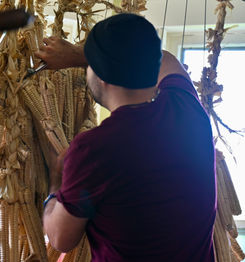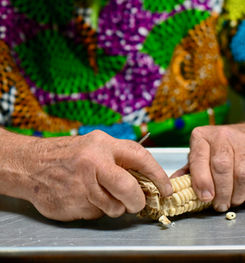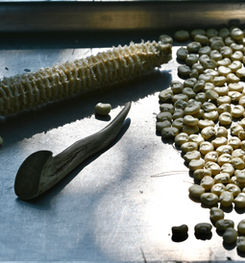
About The White Corn Project
The Iroquois White Corn Project, originally Pinewoods Community Farming, began as the vision of Dr. John Mohawk (Seneca) and Dr. Yvonne Dion-Buffalo (Samson Cree). Their desire to bring White Corn back as a staple of the Haudenosaunee (Iroquois) diet began a decade-long project that has returned to its original home, Ganondagan.
White Corn is traditionally managed and protected to create nutritious corn products from heirloom seeds dating back at least 1,400 years in Haudenosaunee communities. Hand-grown, hand-picked, and hand-processed, White Corn products are non-GMO, gluten-free, and have a low glycemic index.

Dr. John Mohawk (Seneca), founder of the Iroquois White Corn project
Our goal is to restore the farming, consumption, and distribution of traditional White Corn (also know as "Tuscarora White") to Native American communities and to offer White Corn products to the community at large.
White Corn, along with beans and squash, is often called "Three Sisters." Learn more by reading the "Legend of the Three Sisters."
White Corn is available for purchase in the Seneca Art & Culture Center Gift Shop
White Corn Recipes
Support the White Corn Project
Your generosity helps to protect and restore Haudenosaunee food sovereignty.
Donate Today
Your contribution gives the Friends of Ganondagan the ability to continue the important work to protect the sanctity of Haudenosaunee White Corn, preserve ecologically sound, traditional farming and processing methods and to offer educational programs that enhance the appreciation and understanding of this culturally significant food.
Frequency
One time
Monthly
Amount
$25
$50
$100
$200
Other


















